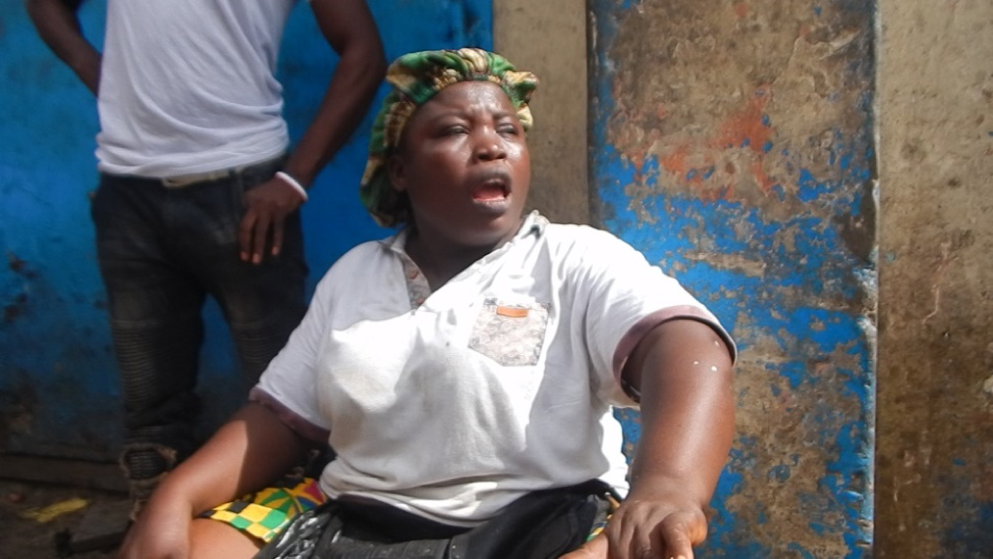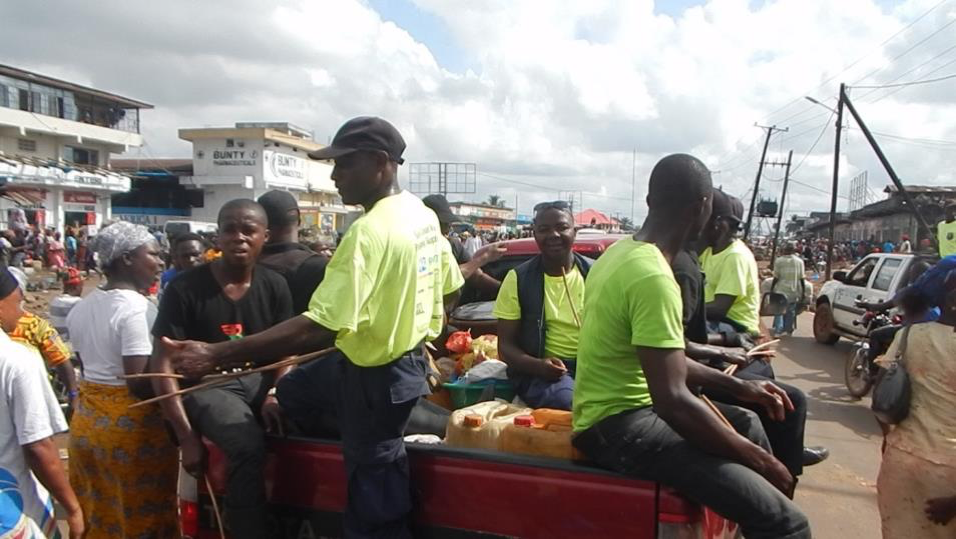MONROVIA, Montserrado – On November 1, Paynesville began enforcing several of its city ordinances, including its ban on commercial activities on Sundays and national holidays.
As The Bush Chicken previously reported, the city had already started attempting to enforce another of its ordinances to decongest ELWA Junction, one of the major commercial districts in the city’s boundaries.
While the city bans commercial activities on Sundays and holidays from 6 a.m. to 6 p.m., traders have generally ignored the ordinance.
On Sunday, Nov. 11, however, officers from the city’s police force were seen out on the streets, confiscating goods from petty traders who were accused of violating the rules.
Police, who were sometimes getting physical with the traders, transported seized goods to the Zone 5 Police Depot 3 located in the Gobachop market.

A police officer meets swift resistance from petty traders as he tries to confiscate her goods. Photo: Zeze Ballah
The petty traders meanwhile, accuse the police of being selective about which businesses are permitted to operate on Sundays. They complained that foreign-owned businesses were allowed to stay open while petty traders were targeted.
This past Sunday, one of such businesses that continued to operate on was the United Trust General Merchandise store located on Pipeline Road.
The owner of the store, who refused to be identified after being approached by Paynesville police officers, said she had a permit from the former mayor, Cyvette M. Gibson, that allowed her to operate on Sundays and holidays. However, petty traders who had gathered near the store grew increasingly angry, with some threatening to shut down the store by force. Eventually, the current mayor, Pam Belcher-Taylor, gave officers the order to close the store.

The United Trust General Merchandise drew attention as it continued to operate despite the ordinance prohibiting commercial activities on Sunday. Photo: Zeze Ballah
Nearby, Marie Davis, who had her goods confiscated, expressed disappointment that this was happening under President George Weah’s administration.
She called the police officers “criminals†who were “stealing our goods.â€
“The government is suffering us and also stealing from us,†she said, as she questioned her decision to vote for Weah in the 2017 elections.
“I want the president to explain to those of us that voted for him if our decision was wrong,†Davis said.

Marie Davis, a trader at the Paynesville Red Light market Photo Zeze Ballah
Many of the traders said they were selling on Sunday because the economy was worsening, and they were not making enough money selling on the other days of the week.
Paynesville’s public relations officer denied claims that officers were stealing goods belonging to traders. Jeremiah Kpadeh Diggen said the police were only implementing the law.
He said traders were allowed to pay fines for nonperishable goods. As for perishables, he said they are distributed to orphanages and other similar facilities. On Sunday, November 11, The Bush Chicken observed the distribution of several food products at the E. S. Grant Mental Health Hospital, the American for Africans Adoption Home, and the Rock of Devine Children’s Home.

Jeremiah Kpadeh Diggen, Paynesville City Corporation’s public relations officer. Photo: Zeze Ballah
Diggen noted that even before the enforcement of the city ordinance, there were public announcements aired on various local radio stations informing the traders about the exercise.
“It is not PCC’s desire to see petty traders’ goods being confiscated,†Diggen said. However, he noted that resistance by traders made it difficult to implement the ordinance.
One benefit of freeing the markets on Sundays, Diggen said, was to give the city’s waste and sanitation team the opportunity to clean the various markets and collect waste from there.
This is not Paynesville’s first attempt to make its traders more orderly or to prevent them from selling on Sundays. The city, like many other Liberian cities, often enforce these ordinances for a limited period and afterward, traders return to the street.
Featured photo by Zeze Ballah



